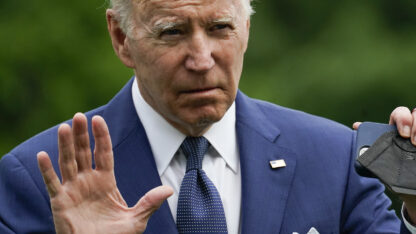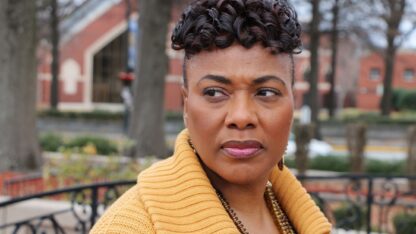The case of three white men charged with murder in the killing of Ahmaud Arbery went to a jury Tuesday after a 13-day trial in which prosecutors argued the defendants provoked a confrontation with the 25-year-old Black man and defense attorneys said their clients acted in self-defense.
“You can’t claim self-defense if you are the unjustified aggressor,” Linda Dunikoski told jurors in her final closing arguments. “Who started this? It wasn’t Ahmaud Arbery.”
>>BURIED TRUTHS: WABE’s award-winning podcast explores key figures and fascinating history of the Arbery case.
The prosecution gets the final word because it carries the burden of proving its case beyond a reasonable doubt. Prosecutors and defense attorneys spent hours on Monday delivering closing arguments that spilled into a second day.
Dunikoski spent two hours Tuesday morning hammering at defense attorneys’ attempts to blame Arbery for his own death. The defense attorneys said Arbery lashed out violently with his fists to resist a lawful citizen’s arrest by the defendants.
Dunikoski said Arbery’s pursuers had “no badge, no uniform, no authority” and were “just some strange guys in a white pickup truck.” And she cited their own words to police immediately after the shooting: that they saw Arbery running but were unsure if he had committed a crime.
“You can’t make a citizen’s arrest because someone’s running down the street and you have no idea what they did wrong,” Dunikoski said.
Once the prosecution wrapped up, Superior Court Judge Timothy Walmsley began giving instructions to the disproportionately white jury on how to apply the law before it can start deliberations at the Glynn County courthouse in the port city of Brunswick.
Arbery’s killing became part of a larger national reckoning on racial injustice after a graphic video of his death leaked online two months later.
The McMichaels grabbed guns and pursued Arbery in a pickup truck after spotting him running through their subdivision on Feb. 23, 2020. Bryan joined the chase and recorded the video of Travis McMichael opening fire as Arbery threw punches and grabbed for McMichael’s shotgun.
No one was charged in the killing until Bryan’s video leaked and the Georgia Bureau of Investigation took over the case from local police. All three men are charged with murder and other offenses.
Dunikoski said Tuesday that the McMichaels and Bryan threatened Arbery both with their pickup trucks and by pointing a shotgun at him before the final confrontation in which Arbery threw punches and grabbed for the gun.
She noted that Bryan told police he used his truck to run Arbery into a ditch and cut off his route, while Greg McMichael told officers they had him “trapped like a rat.” The actions of both men, she said, directly contributed to Arbery’s death.
“It doesn’t matter who actually pulled the trigger,” Dunikoski said. “Under the law, they’re all guilty.”
She also said there was no evidence Arbery had committed crimes in the defendants’ neighborhood. She said he was never seen stealing anything the five times he was recorded by security cameras in an unfinished home under construction from which he was seen running.
“You’ve got lumber, you’ve got all this stuff,” Dunikoski said. “Mr. Arbery never shows up with a bag. He doesn’t pull up with a U-haul. … All he does is wander around for a few minutes and then leave.”
The prosecutor told jurors someone can only make a citizen’s arrest in “emergency situations” where a crime is happening “right then and there.”
Defense attorneys objected to Dunikoski’s explanation of citizen’s arrest because they contend the McMichaels had reason to suspect Arbery had stolen items from the home. They said the owner discovered the items missing before he installed security cameras.
“This is a misstatement of the law and the argument is improper,” Franklin Hogue, an attorney for Greg McMichael, told the judge. “There’s no way we can fix it” before the jury, he said, because defense attorneys finished their closing arguments Monday.
Attorney Jason Sheffield said his client, Travis McMichael, fired his shotgun in self-defense after Arbery charged at him, threw punches and tried to grab the weapon. Sheffield called Arbery’s death a tragedy, but one that was his own fault.
Attorneys for the other two defendants blamed Arbery as well. Laura Hogue, an attorney for Greg McMichael, said Arbery “chose to fight.” Kevin Gough, who represents Bryan, questioned why Arbery didn’t call for help if he was in danger.
“Maybe that’s because Mr. Arbery doesn’t want help,” Gough said.
Arbery had enrolled at a technical college and was preparing at the time to study to become an electrician like his uncles.
For a deeper exploration of Ahmaud Arbery’s story, listen to WABE’s podcast, “Buried Truths.” Hosted by journalist, professor, and Pulitzer-prize-winning author Hank Klibanoff, season three of “Buried Truths” explores the Arbery murder and its direct ties to racially motivated murders of the past in Georgia.









